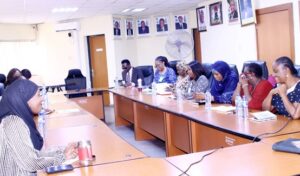As Nigeria joins other countries of the world in the march toward a low-carbon future, groups—like Spaces for Change | S4C and others—are undertaking research and advocacy initiatives aimed at bolstering the implementation of national plans to transition away from fossil fuels. Between February 27-29, S4C presented research evidence from the IDS-supported Just Transitions Learning Project, sharing insights with federal agencies tasked with formulating and implementing policies regulating energy, climate change, environmental protection, and renewable energy production.
Agencies engaged at the federal level are the National Council on Climate Change (NCCC), National Extractive Industries Transparency Initiative (NEITI), National Human Rights Commission (NHRC) and the National Oil Spill Detection and Response Agency. S4C’s policy briefs, titled, ‘Energy Transition in Nigeria: Expanding Opportunities for Inclusive Engagement, shared with agencies during advocacy meetings highlighted the strengths and gaps within existing climate policy interventions and proffered recommendations for addressing the shortcomings and for deepening inclusion in the transition agenda. It was against this backdrop that S4C urged authorities to mainstream justice into national plans toward transiting to a low-carbon economy while utilizing community voices as valuable data
While the various policy responses to climate change by state and federal governments represent positive steps, several implementation gaps, however, remain. Social justice issues such as limited stakeholder involvement in policy formulation, policy silence on oil-bearing communities, absence of consideration for human rights and gender issues in transition plans, lack of defined roles for state and local governments, regulatory and policy overlaps, the unaffordability of clean energy sources and technologies, and the ambiguous nature of national advocacy strategies like the Energy Transition Plan (ETP), are some examples of apparent obstacles towards progress.
Grounded on research evidence, the recommendations proffered in the policy brief harped on the importance of community engagement, environmental accountability, gender equality, provision of alternative livelihoods, and the establishment of a comprehensive review mechanism, among others Agencies received the research and policy recommendations with great interest. Areas that generated strong interest include local demands for restorative justice and the provision of alternative livelihoods especially in areas where artisanal refining of petroleum takes place. The evidence provided spurred conversations around updating national climate commitments as well as strengthening collaborations between government and civil society in national decarbonization plans.
S4C’s advocacy visits underscored the need for collaborative problem-solving by a diversity of stakeholders to ensure a successful energy transition in Nigeria. The visits also afforded S4C an opportunity to deepen the organization’s understanding of the mandates and activities of these agencies in achieving a just transition. Addressing the identified gaps and implementing inclusive strategies are pivotal for a just transition where no one is left behind.





















